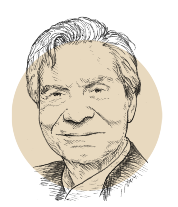We see better from afar and through the eyes of others. In order to understand today’s United States, Alexis de Tocqueville provides certain old keys that continue to open many a door. But who are the American Tocquevilles who can see deep into France? The foremost of these are Francophile historians such as Steven Kaplan, David Bell, and Robert Darnton, who are fascinated by the 18th century. But France cannot be understood exclusively through the Age of Enlightenment; without knowledge of the past, our present is illegible.
Let us try to discern a few of those tendencies that make our nation immutable. First there is the weight of the state, the master of our daily lives since Louis XIV. The French state is the most spendthrift in the West, taxing and redistributing more than half of the national wealth. Is this redistribution effective? We have no idea, since, in the absence of significant competition in the health, education, public transportation, and energy sectors, it is impossible to measure the value of our taxation. The French have been protesting for three centuries, but they put up with it and make a right out of their dependency: a right to health, to transportation, and to retirement. And when their well-being declines in the slightest, it is the state that they blame. It was Louis XIV who proclaimed: “L’Etat, c’est moi” (“I am the state”). But is Emmanuel Macron not the heir of this monarchy, now in republican form? Five years ago, he decreed that France would become a “start-up nation”; a home for private initiative, which it has not become, despite the declaration from on high. Today, from the same lofty position, the president is ordering us to enter an era of sobriety and negative growth, without consulting those who already live below the poverty line. “Let them eat cake,” as Marie Antoinette would say.
In the same way, the economy can only be understood through history. France remains dominant in the areas where it has led for centuries: luxury goods, fashion, weapons, and agriculture. Our large companies have inherited traditional trades, which are now modernized and globalized, but nothing radically new has upset this order of national wealth.
Ideological quarrels also bear the stamp of our long history. The French left remains anchored in its revolutionary origins. The foundations of 1789 have been joined by a tradition of utopian socialism that arose in the 1820s, before Marx. As for the right, its ancient loyalty to the Catholic Church has left it with a taste for authority, hierarchy, and the majesty of the state. De Gaulle was a true representative of this tradition. This French right was never libertarian, neither in morals nor in economics; it has learned to live with cultural diversity and with capitalism, but without loving them. There has never been, and there will never be, a Ronald Reagan à la française.
Another constant feature is the permanent quarrel between Paris and the provinces, the Jacobin centralizers versus the 35,000 mayors, the Girondist guardians of local liberties. This constant squabbling over legitimacy, ongoing since the confrontations between the French kings and the provincial parliaments, is mostly a silent one – but not always, as proven by the Yellow Vest uprising.
French views on immigration have not changed, either. France is a nation of immigrants that doesn’t see itself as such. Arabs may not be welcome, but neither were the Italians, Spanish, Portuguese, and Jews before them. When Polish workers arrived in droves in the 1920s to get the mines and blast furnaces working again after the war, no French priest would say mass for them – even though they were Catholic. But as soon as immigrants are integrated, their origins are forgotten. The son of a Senegalese immigrant is now the Minister of National Education, and a woman of Lebanese origin is the Minister of Culture. No one finds this shocking, since both are models of assimilation, as opposed to the American idea of multiculturalism.
Another long-term trend is feminism. Its French origins go back to Olympe de Gouges, author of the 1791 Declaration of the Rights of Woman and of the Female Citizen. Somewhat ahead of her time, she was guillotined two years later. Is Simone de Beauvoir, the mother of all feminists, not her direct descendant?
We cannot conclude without mentioning the disproportionate role played by intellectuals. In the United States, they are confined to their universities and their disciplines; in France, they dictate what is good and what is evil on television. All writers see themselves as Voltaire or Sartre, and they are venerated as such.
This framework of French society is obviously affected by the world knocking at our door and by techno-cultural innovations such as social media. But despite it all, our DNA remains the same.
Editorial published in the November 2022 issue of France-Amérique. Subscribe to the magazine.












